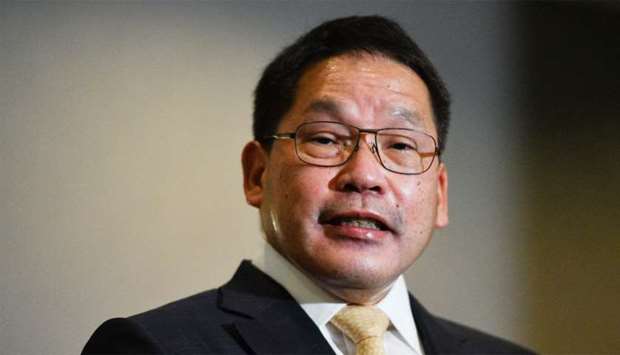* Minister resigns with immediate effect
* Thai bankers' association head expected to be new FinMin: media
* Thailand also in process of picking new central bank chief
Thai Finance Minister Uttama Savanayana resigned on Thursday in a move that adds uncertainty to policy-making as Southeast Asia's worst-performing economy struggles to recover from the impact of the COVID-19 crisis.
Two other ministers and economic policy czar Somkid Jatusripitak also resigned, in a major cabinet shake-up that left investors anxious over who would lead Southeast Asia's second-largest economy out of a deep slump.
The departure of Uttama comes as the government rolls out billions of dollars of stimulus measures to support the economy through the pandemic, which has battered tourism and domestic activity.
‘It's an appropriate time to resign,’ Uttama told reporters, adding it was his own decision and he was under ‘no pressure’ to leave.
Uttama and the two ministers quit the ruling Palang Pracharat party of Prime Minister Prayuth Chan-ocha last week after Uttama was replaced as party leader late last month.
He said he decided to quit his cabinet post to ‘lessen possible political pressure, particularly on the prime minister’ and to end uncertainty about a rumoured cabinet reshuffle.
Thai Bankers' Association President Predee Daochai is expected to be the next finance minister, according to media reports.
Prayuth said the cabinet reshuffle would take place by next month, having earlier said it would happen in September.
‘We have to reshuffle the cabinet so there won't be a gap.
It must be done as quickly as possible...
no later than next month,’ Prayuth told reporters.
In the meantime, Deputy Finance Minister Santi Promphat would run the day-to-day affairs of the ministry.
Thosaporn Sirisumphand, secretary-general of the state planning agency, is reported to be the favourite to replace Deputy Prime Minister Somkid, according to media.
The energy minister and the minister of Higher Education, Science, Research and Innovation also resigned as part of the shake-up.
‘One of the most immediate issues is how soon a new economic team will replace them,’ said Tim Leelahaphan, economist at Standard Chartered Bank.
The shake-up comes as a process is underway to pick a new governor of the Bank of Thailand (BOT), who will inherit interest rates near zero %, a stubbornly strong currency and a mountain of household debt.
The central bank predicts Thailand's economy will shrink by a record 8.1% this year.
Sethaput Suthiwart-Narueput, a former World Bank economist and an economic advisor to the prime minister, is leading in the race to be new governor, according to media reports.
‘The markets are anxious who will fill the shoes of the economic portfolios, as the change also has implications for the central bank governor's selection process,’ said Kobsidthi Silpachai, head of capital markets research at Kasikornbank.
Charnon Boonnuch, economist at Nomura in Singapore, said ‘elevated political uncertainty remains an important headwind to the economy, as it is an obstacle to long-term reform and large-scale investment’.

